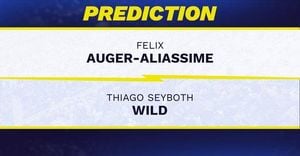The Ministry of Education and Science of Ukraine has announced significant changes regarding how graduates of the 9th and 11th grades will be recognized for their academic achievements. As of December 20, 2024, the issuance of gold and silver medals for high academic performance has been abolished, marking a notable shift in the educational reward system.
According to the Ministry, graduates will now receive certificates with honors instead of the traditional medals. The new directive, outlined in Order No. 1771, emphasizes that students in the 9th grade will earn a certificate of basic secondary education with honors if they achieve grades ranging from 10 to 12 across all subjects for the 9th grade, as well as in the state final examination, if conducted. Notably, grades from 5th to 8th grades will not be considered in this evaluation.
Similarly, students graduating from the 11th (or 12th) grade will receive a certificate of complete general secondary education with honors if they maintain grades of 10 to 12 in all subjects studied at the specialized secondary education level, along with satisfactory results in the state final examination. In this case, only grades from the 11th (or 12th) grade and relevant subjects from the 10th grade will be factored into the final assessment.
While the government will no longer provide funding for gold and silver medals, educational institutions, local authorities, and public associations can still introduce various forms of recognition, such as diplomas and commendations. The Ministry of Education stressed that school leaders should consider not only formal academic achievements but also the personal accomplishments of students when awarding certificates with honors.
This reform follows a series of discussions and recommendations aimed at reevaluating the existing system of awards for school graduates. In August 2024, the educational ombudsman proposed a reconsideration of the gold and silver medal system, prompting the Verkhovna Rada committee on education, science, and innovation to recommend the cancellation of state-issued medals. The committee chair, Serhiy Babak, later clarified that while schools could still award medals, they would not be funded by the state.
In a related development, Olga Demenko, the Director of the Department of Education of the Kharkiv City Council, addressed concerns regarding teacher shortages in the city. She confirmed that there is currently no deficit of teachers, as both internally displaced persons (IDPs) and recent graduates are being hired to fill positions. Demenko elaborated on the salary structure for teachers, noting that those teaching in underground educational settings receive additional allowances of 20% to 30%, while primary school teachers receive a standard 20% allowance.
The funding for teachers' salaries comes from the educational state subvention, which has faced budgetary constraints this year. As a result, the city council has appealed to the Cabinet of Ministers to increase the educational subvention to ensure teachers receive adequate compensation for their work. Demenko expressed her concern that the teaching profession is undervalued, stating, "We understand that our teachers are smart, intelligent, creative, heroic, and patient, and they all understand that we are at war and that there is no opportunity to pay everyone adequately."
Despite the financial challenges, Demenko reassured the public that there are no plans to reduce the number of teaching staff in Kharkiv. "We keep this situation under constant control," she stated, referencing draft orders from the ministry that have caused some panic among teachers. However, she emphasized that no schools will be closed and no teachers will lose their jobs, as the city is committed to maintaining a robust educational workforce.
Furthermore, she highlighted that vacancies for teaching positions are rare during the academic year, typically arising only in the summer months when teachers retire or move away. The city is actively working to ensure that all teaching positions are filled to maintain quality education for students.
In summary, the shift from medals to certificates with honors represents a significant change in how academic success is recognized in Ukraine. Meanwhile, the commitment to supporting teachers in Kharkiv amidst financial difficulties underscores the ongoing challenges faced by the education sector in the region. As the academic year progresses, both students and educators are adapting to these changes, aiming for a successful educational experience despite the surrounding uncertainties.




